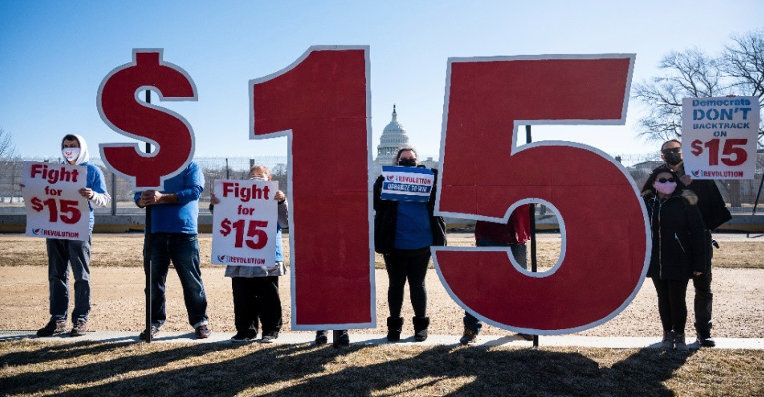CommentsLIVING WAGE DEBATE-Missing from the Congressional debate over raising the $7.25 federal minimum wage to $15 an hour is any acknowledgement that poverty-level wages are integral to a class system that rewards the rich and punishes the poor.
With few exceptions, where a person ends up in life — in terms of health, wealth, and general wellbeing — is determined by the economic class into which they are born. People born poor die poor. People born rich die rich. This basic, intrinsic feature of American political economy is shaded from view by our culture’s celebration of the so-called meritocracy, the myth that if a person works hard enough, they can win at any table, despite the stacked deck.
Government can intervene to lift people out of poverty. The 1944 GI Bill, for example, enabled the families of millions of World War II vets to enter the middle class. Because of structural racism, however, most of those who benefited were white. The legislation did not guarantee the same housing and educational benefits to 1.2 million Black vets.
On March 5, the Senate had another opportunity to lift millions out of poverty, this time by raising the minimum wage to $15. But 50 Republicans, seven Democrats and an Independent voted against the bill sponsored by Sen. Bernie Sanders (I‑Vt.). In doing so, they denied a raise to the 32 million workers — about 21% of the workforce — including 31% of Black workers, 26% percent of Hispanic workers and 20% of white workers. That number includes the 1.1 million Americans who earn $7.25 or less, and the approximately 20.6 million who earn a “near-minimum” wage of up to $10.10, according to the Pew Research Center.
Like $7.25 an hour, $10.10 is not a “living wage,” the earnings needed to cover the cost of a family’s basic necessities, as defined by the Massachusetts Institute of Technology’s Living Wage Calculator project. By MIT’s calculation, a couple with two children who each earn $10.10 an hour would both need to work more than 65 hours a week, 52 weeks a year, to earn the $68,808 living wage they need. Some people try to do it; according to the Census Bureau, around 7.8% of workers hold more than one job.
On March 5, the Senate had another opportunity to lift millions out of poverty, by raising the minimum wage to $15. But 50 Republicans and seven Democrats voted against the bill.
When former enslaved person and abolitionist Frederick Douglass took his first paying job, he declared, “Now I am my own master.” But by 1883, he observed, “Experience demonstrates that there may be a slavery of wages only a little less galling and crushing in its effects than chattel slavery, and that this slavery of wages must go down with the other.”
The condition of wage workers has improved since the depravities of the Gilded Age because of the tireless work of the American labor movement. That movement, however, has atrophied in recent decades, with membership declining from its 1954 high of 34.8% of the workforce to the current 10.8%.
Though his bill was defeated, Sanders vowed to fight on: “If any Senator believes this is the last time they will cast a vote on whether or not to give a raise to 32 million Americans, they are sorely mistaken.”
In addition to giving that raise, next on the progressive agenda should be the Protecting the Right to Organize (PRO) Act, which passed the House on March 9, and now heads to the Senate. If passed, it would enshrine the basic right of workers to organize without interference from their employers. It would also allow workers to engage in political strikes, secondary strikes and solidarity strikes —powerful tactics once despised by anti-New-Dealers who sought to rein in worker power with the Taft-Hartley Act.
American workers need a raise. They also need power over their workplaces and their own lives.
(Joel Bleifuss, a former director of the Peace Studies Program at the University of Missouri-Columbia, is the editor & publisher of In These Times, where he has worked since October 1986. This piece appeared in Common Dreams.) Photo: Bill Clark/CQ-Roll Call, Inc. via Getty Images. Prepped for CityWatch by Linda Abrams.
